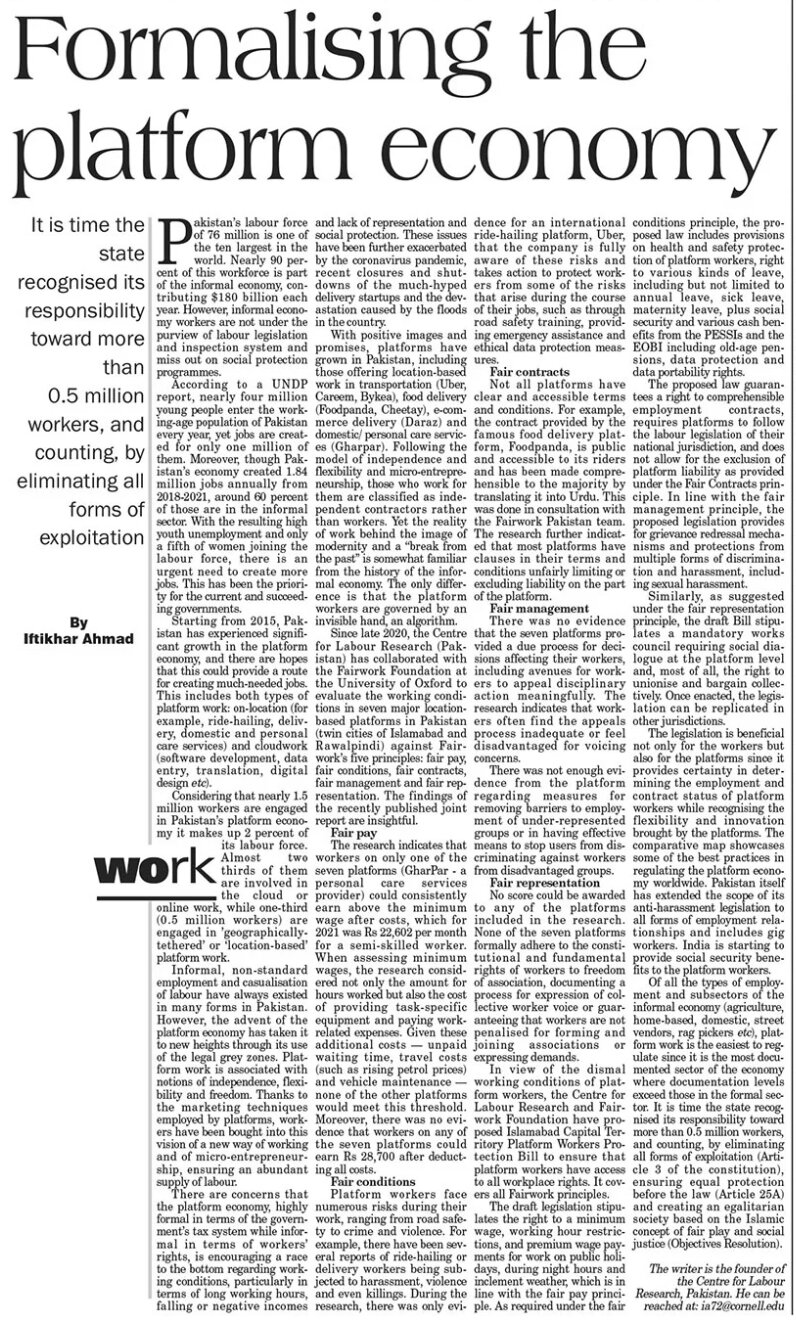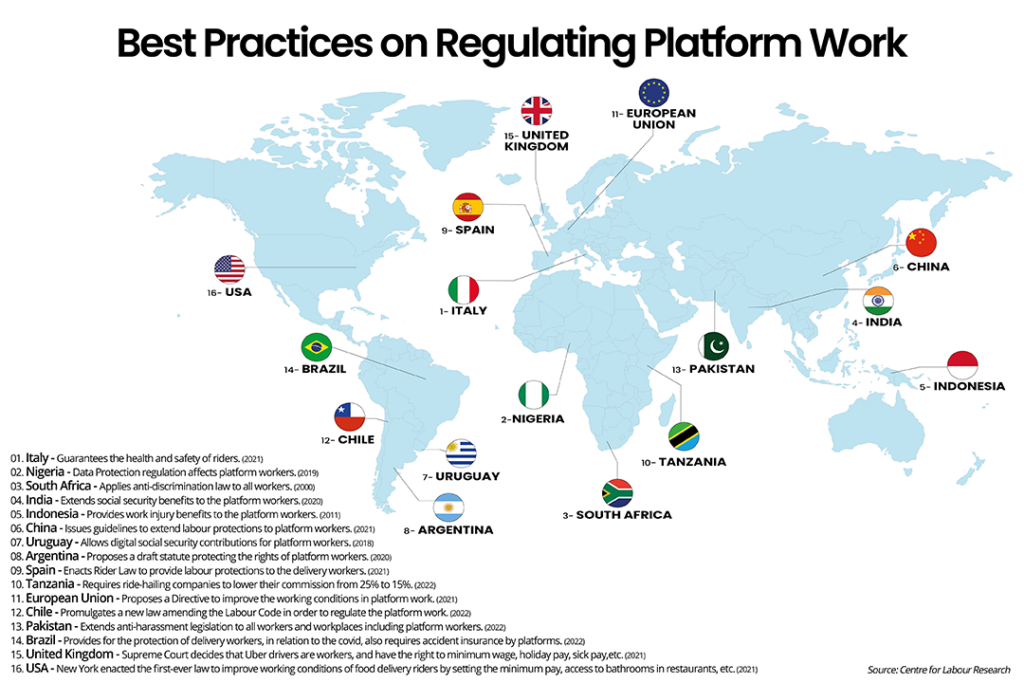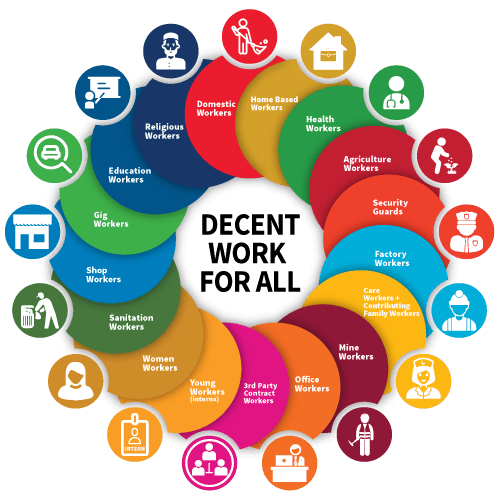

Pakistan’s labour force of 76 million is one of the ten largest in the world. Nearly 90 percent of this workforce is part of the informal economy, contributing $180 billion each year. However, informal economy workers are not under the purview of labour legislation and inspection system and miss out on social protection programmes.
According to a UNDP report, nearly four million young people enter the working-age population of Pakistan every year, yet jobs are created for only one million of them. Moreover, though Pakistan’s economy created 1.84 million jobs annually from 2018-2021, around 60 percent of those are in the informal sector. With the resulting high youth unemployment and only a fifth of women joining the labour force, there is an urgent need to create more jobs. This has been the priority for the current and succeeding governments.
Starting from 2015, Pakistan has experienced significant growth in the platform economy, and there are hopes that this could provide a route for creating much-needed jobs. This includes both types of platform work: on-location (for example, ride-hailing, delivery, domestic and personal care services) and cloudwork (software development, data entry, translation, digital design etc).
Considering that nearly 1.5 million workers are engaged in Pakistan’s platform economy it makes up 2 percent of its labour force. Almost two thirds of them are involved in the cloud or online work, while one-third (0.5 million workers) are engaged in ’geographically-tethered’ or ‘location-based’ platform work.
Considering that nearly 1.5 million workers are engaged in Pakistan’s platform economy it makes up 2 percent of its labour force. Almost two thirds of them are involved in the cloud or online work, while one-third (0.5 million workers) are engaged in ’geographically-tethered’ or ‘location-based’ platform work.
Informal, non-standard employment and casualisation of labour have always existed in many forms in Pakistan. However, the advent of the platform economy has taken it to new heights through its use of the legal grey zones. Platform work is associated with notions of independence, flexibility and freedom. Thanks to the marketing techniques employed by platforms, workers have been bought into this vision of a new way of working and of micro-entrepreneurship, ensuring an abundant supply of labour.
There are concerns that the platform economy, highly formal in terms of the government’s tax system while informal in terms of workers’ rights, is encouraging a race to the bottom regarding working conditions, particularly in terms of long working hours, falling or negative incomes and lack of representation and social protection. These issues have been further exacerbated by the coronavirus pandemic, recent closures and shutdowns of the much-hyped delivery startups and the devastation caused by the floods in the country.
With positive images and promises, platforms have grown in Pakistan, including those offering location-based work in transportation (Uber, Careem, Bykea), food delivery (Foodpanda, Cheetay), e-commerce delivery (Daraz) and domestic/ personal care services (Gharpar). Following the model of independence and flexibility and micro-entrepreneurship, those who work for them are classified as independent contractors rather than workers. Yet the reality of work behind the image of modernity and a “break from the past” is somewhat familiar from the history of the informal economy. The only difference is that the platform workers are governed by an invisible hand, an algorithm.
Since late 2020, the Centre for Labour Research (Pakistan) has collaborated with the Fairwork Foundation at the University of Oxford to evaluate the working conditions in seven major location-based platforms in Pakistan (twin cities of Islamabad and Rawalpindi) against Fairwork’s five principles: fair pay, fair conditions, fair contracts, fair management and fair representation. The findings of the recently published joint report are insightful.
Fair pay
The research indicates that workers on only one of the seven platforms (GharPar – a personal care services provider) could consistently earn above the minimum wage after costs, which for 2021 was Rs 22,602 per month for a semi-skilled worker. When assessing minimum wages, the research considered not only the amount for hours worked but also the cost of providing task-specific equipment and paying work-related expenses. Given these additional costs — unpaid waiting time, travel costs (such as rising petrol prices) and vehicle maintenance — none of the other platforms would meet this threshold. Moreover, there was no evidence that workers on any of the seven platforms could earn Rs 28,700 after deducting all costs.
Fair conditions
Platform workers face numerous risks during their work, ranging from road safety to crime and violence. For example, there have been several reports of ride-hailing or delivery workers being subjected to harassment, violence and even killings. During the research, there was only evidence for an international ride-hailing platform, Uber, that the company is fully aware of these risks and takes action to protect workers from some of the risks that arise during the course of their jobs, such as through road safety training, providing emergency assistance and ethical data protection measures.
Fair contracts
Not all platforms have clear and accessible terms and conditions. For example, the contract provided by the famous food delivery platform, Foodpanda, is public and accessible to its riders and has been made comprehensible to the majority by translating it into Urdu. This was done in consultation with the Fairwork Pakistan team. The research further indicated that most platforms have clauses in their terms and conditions unfairly limiting or excluding liability on the part of the platform.
Fair management
There was no evidence that the seven platforms provided a due process for decisions affecting their workers, including avenues for workers to appeal disciplinary action meaningfully. The research indicates that workers often find the appeals process inadequate or feel disadvantaged for voicing concerns.
There was not enough evidence from the platform regarding measures for removing barriers to employment of under-represented groups or in having effective means to stop users from discriminating against workers from disadvantaged groups.
Fair representation
No score could be awarded to any of the platforms included in the research. None of the seven platforms formally adhere to the constitutional and fundamental rights of workers to freedom of association, documenting a process for expression of collective worker voice or guaranteeing that workers are not penalised for forming and joining associations or expressing demands.
In view of the dismal working conditions of platform workers, the Centre for Labour Research and Fairwork Foundation have proposed Islamabad Capital Territory Platform Workers Protection Bill to ensure that platform workers have access to all workplace rights. It covers all Fairwork principles.
The draft legislation stipulates the right to a minimum wage, working hour restrictions, and premium wage payments for work on public holidays, during night hours and inclement weather, which is in line with the fair pay principle. As required under the fair conditions principle, the proposed law includes provisions on health and safety protection of platform workers, right to various kinds of leave, including but not limited to annual leave, sick leave, maternity leave, plus social security and various cash benefits from the PESSIs and the EOBI including old-age pensions, data protection and data portability rights.
The proposed law guarantees a right to comprehensible employment contracts, requires platforms to follow the labour legislation of their national jurisdiction, and does not allow for the exclusion of platform liability as provided under the Fair Contracts principle. In line with the fair management principle, the proposed legislation provides for grievance redressal mechanisms and protections from multiple forms of discrimination and harassment, including sexual harassment.
Similarly, as suggested under the fair representation principle, the draft Bill stipulates a mandatory works council requiring social dialogue at the platform level and, most of all, the right to unionise and bargain collectively. Once enacted, the legislation can be replicated in other jurisdictions.
The legislation is beneficial not only for the workers but also for the platforms since it provides certainty in determining the employment and contract status of platform workers while recognising the flexibility and innovation brought by the platforms. The comparative map showcases some of the best practices in regulating the platform economy worldwide. Pakistan itself has extended the scope of its anti-harassment legislation to all forms of employment relationships and includes gig workers. India is starting to provide social security benefits to the platform workers.
Of all the types of employment and subsectors of the informal economy (agriculture, home-based, domestic, street vendors, rag pickers etc), platform work is the easiest to regulate since it is the most documented sector of the economy where documentation levels exceed those in the formal sector. It is time the state recognised its responsibility toward more than 0.5 million workers, and counting, by eliminating all forms of exploitation (Article 3 of the constitution), ensuring equal protection before the law (Article 25A) and creating an egalitarian society based on the Islamic concept of fair play and social justice (Objectives Resolution).
The article was published on TNS 4 September 2022

